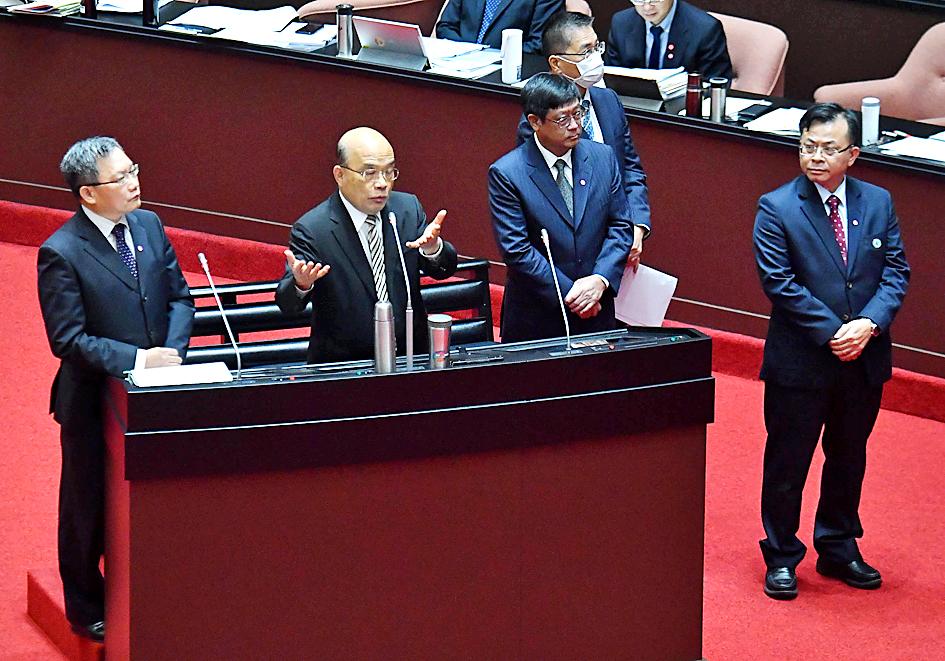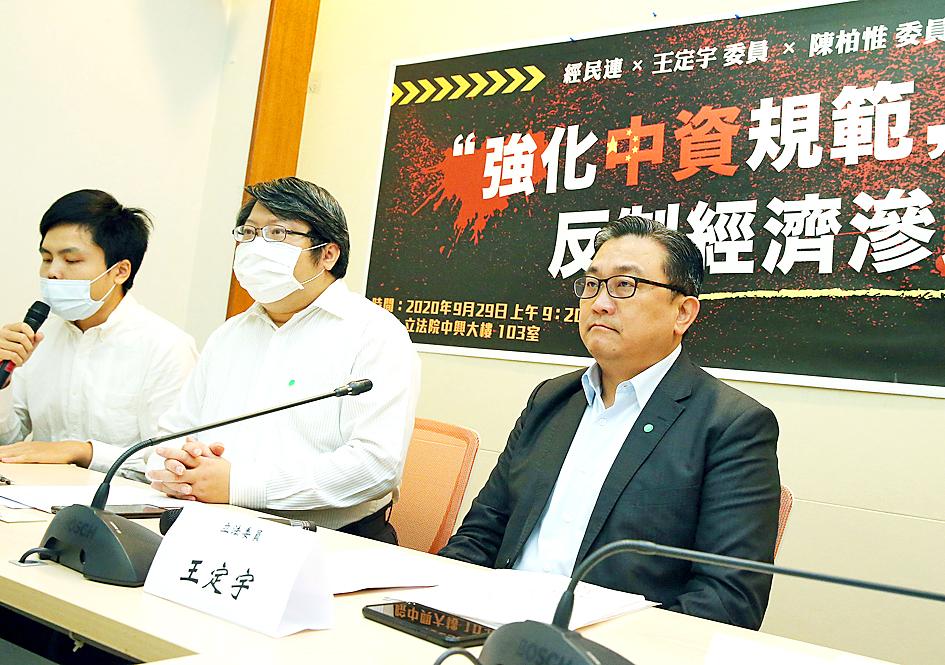The government would investigate claims that no university has ever been punished for signing letters affirming Beijing’s “one China” principle, and handle infractions appropriately, Premier Su Tseng-chang (蘇貞昌) said yesterday.
“Academic exchanges should not come with political preconditions,” Su told reporters at the Legislative Yuan in Taipei.
In March 2017, Shih Hsin University was found to have signed an agreement with three Chinese universities to refrain from discussing any “sensitive political topics” in courses or activities attended by Chinese students.

Photo: CNA
The Ministry of Education said at the time that 72 of the nation’s 157 tertiary institutions had signed similar letters since 2005.
However, a recent investigation by the ministry found that no school has ever been penalized for signing such letters, since universities are self-administered.
Democratic Progressive Party (DPP) legislators Wang Ting-yu (王定宇) and Chao Tien-lin (趙天麟) have proposed amending the Act Governing Relations Between the People of the Taiwan Area and the Mainland Area (兩岸人民關係條例) to tackle China’s “united front” tactics.

Photo: CNA
There is a loophole in the section that governs cross-strait educational exchanges, Wang said on Monday.
Article 33-3 states that schools must apply for permission before “forming any coalition or engaging in any other cooperative activity or any written agreement” with a Chinese institution, Wang said.
Under the proposed amendment, the article would be changed to clarify that restricted activities include “concluding a coalition, written agreement or cooperative activity, or a unilateral agreement or declaration,” he said.
The second paragraph would be changed to say that exchanges must not “involve any content of a political nature” to they must not “involve cooperation with united front political objectives of the Mainland area,” he said.
The proposal would also amend Article 90-2 to require authorities to cut off financial assistance or restrict enrollment for schools found guilty of contravening the provisions.
“China wants to eliminate our nation’s sovereignty,” he said. “How can Taiwanese schools allow other countries to use the ‘one China’ principle to limit academic exchange and education?”
Amending the law would protect teachers from Chinese coercion and ensure that schools report infractions to the ministry, Wang added.
“Taiwan already bans political and military entities from school campuses, how could it allow the Chinese Communist Party to sneak its way in?” he said.
Taiwan Statebuilding Party Legislator Chen Po-wei (陳柏惟) yesterday told reporters that he supports the proposals, because while China claims it is not creating conflict with other nations, it is accustomed to using “united front” tactics against Taiwan.
While Chinese missiles cannot annihilate, Beijing seeks to use psychological, cultural, educational and other tactics to “win over” Taiwan, Chen said.

DAREDEVIL: Honnold said it had always been a dream of his to climb Taipei 101, while a Netflix producer said the skyscraper was ‘a real icon of this country’ US climber Alex Honnold yesterday took on Taiwan’s tallest building, becoming the first person to scale Taipei 101 without a rope, harness or safety net. Hundreds of spectators gathered at the base of the 101-story skyscraper to watch Honnold, 40, embark on his daredevil feat, which was also broadcast live on Netflix. Dressed in a red T-shirt and yellow custom-made climbing shoes, Honnold swiftly moved up the southeast face of the glass and steel building. At one point, he stepped onto a platform midway up to wave down at fans and onlookers who were taking photos. People watching from inside

A Vietnamese migrant worker yesterday won NT$12 million (US$379,627) on a Lunar New Year scratch card in Kaohsiung as part of Taiwan Lottery Co’s (台灣彩券) “NT$12 Million Grand Fortune” (1200萬大吉利) game. The man was the first top-prize winner of the new game launched on Jan. 6 to mark the Lunar New Year. Three Vietnamese migrant workers visited a Taiwan Lottery shop on Xinyue Street in Kaohsiung’s Gangshan District (崗山), a store representative said. The player bought multiple tickets and, after winning nothing, held the final lottery ticket in one hand and rubbed the store’s statue of the Maitreya Buddha’s belly with the other,

‘COMMITTED TO DETERRENCE’: Washington would stand by its allies, but it can only help as much as countries help themselves, Raymond Greene said The US is committed to deterrence in the first island chain, but it should not bear the burden alone, as “freedom is not free,” American Institute in Taiwan Director Raymond Greene said in a speech at the Institute for National Defense and Security Research’s “Strengthening Resilience: Defense as the Engine of Development” seminar in Taipei yesterday. In the speech, titled “Investing Together and a Secure and Prosperous Future,” Greene highlighted the contributions of US President Donald Trump’s administration to Taiwan’s defense efforts, including the establishment of supply chains for drones and autonomous systems, offers of security assistance and the expansion of

STREAMLINED: The dedicated funding would allow the US to transfer equipment to Taiwan when needed and order upgraded replacements for stockpiles, a source said The US House of Representatives on Thursday passed a defense appropriations bill totaling US$838.7 billion, of which US$1 billion is to be allocated to reinforcing security cooperation with Taiwan and US$150 million to replace defense articles provided to the nation. These are part of the Consolidated Appropriation Act, which the US House yesterday passed with 341 votes in favor and 88 against. The act must be passed by the US Senate before Friday next week to avoid another government shutdown. The US House Committee on Appropriations on Monday unveiled the act, saying that it allocates US$1 billion for the Taiwan Security Cooperation Initiative